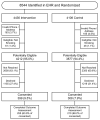Proactive tobacco cessation outreach to smokers of low socioeconomic status: a randomized clinical trial
- PMID: 25506771
- PMCID: PMC4590783
- DOI: 10.1001/jamainternmed.2014.6674
Proactive tobacco cessation outreach to smokers of low socioeconomic status: a randomized clinical trial
Erratum in
-
Errors in intervention cost per smoker.JAMA Intern Med. 2015 May;175(5):869. doi: 10.1001/jamainternmed.2015.1257. JAMA Intern Med. 2015. PMID: 25938323 No abstract available.
Abstract
Importance: Widening socioeconomic disparities in mortality in the United States are largely explained by slower declines in tobacco use among smokers of low socioeconomic status (SES) than among those of higher SES, which points to the need for targeted tobacco cessation interventions. Documentation of smoking status in electronic health records (EHRs) provides the tools for health systems to proactively offer tobacco treatment to socioeconomically disadvantaged smokers.
Objective: To evaluate a proactive tobacco cessation strategy that addresses sociocontextual mediators of tobacco use for low-SES smokers.
Design, setting, and participants: This prospective, randomized clinical trial included low-SES adult smokers who described their race and/or ethnicity as black, Hispanic, or white and received primary care at 1 of 13 practices in the greater Boston area (intervention group, n = 399; control group, n = 308).
Interventions: We analyzed EHRs to identify potentially eligible participants and then used interactive voice response (IVR) techniques to reach out to them. Consenting patients were randomized to either receive usual care from their own health care team or enter an intervention program that included (1) telephone-based motivational counseling, (2) free nicotine replacement therapy (NRT) for 6 weeks, (3) access to community-based referrals to address sociocontextual mediators of tobacco use, and (4) integration of all these components into their normal health care through the EHR system.
Main outcomes and measures: Self-reported past-7-day tobacco abstinence 9 months after randomization ("quitting"), assessed by automated caller or blinded study staff.
Results: The intervention group had a higher quit rate than the usual care group (17.8% vs 8.1%; odds ratio, 2.5; 95% CI, 1.5-4.0; number needed to treat, 10). We examined whether use of intervention components was associated with quitting among individuals in the intervention group: individuals who participated in the telephone counseling were more likely to quit than those who did not (21.2% vs 10.4%; P < .001). There was no difference in quitting by use of NRT. Quitting did not differ by a request for a community referral, but individuals who used their referral were more likely to quit than those who did not (43.6% vs 15.3%; P < .001).
Conclusions and relevance: Proactive, IVR-facilitated outreach enables engagement with low-SES smokers. Providing counseling, NRT, and access to community-based resources to address sociocontextual mediators among smokers reached in this setting is effective.
Trial registration: clinicaltrials.gov Identifier: NCT01156610.
Figures



Comment in
-
Proactive outreach strategies to connect smokers with tobacco cessation treatment.JAMA Intern Med. 2015 Feb;175(2):226-7. doi: 10.1001/jamainternmed.2014.5291. JAMA Intern Med. 2015. PMID: 25506736 No abstract available.
-
Smoking cessation strategies may increase quit rates among adults of low socioeconomic status.Evid Based Nurs. 2016 Jan;19(1):17. doi: 10.1136/eb-2015-102090. Epub 2015 Jun 23. Evid Based Nurs. 2016. PMID: 26103980 No abstract available.
References
-
- Schroeder SA, Koh HK. Tobacco control 50 years after the 1964 surgeon general’s report. JAMA : the journal of the American Medical Association. 2014;311:141–3. - PubMed
-
- Haiman CA, Stram DO, Wilkens LR, Pike MC, Kolonel LN, Henderson BE, Le Marchand L. Ethnic and racial differences in the smoking-related risk of lung cancer. N Engl J Med. 2006;354:333–42. - PubMed
-
- Browning KK, Ferketich AK, Salsberry PJ, Wewers ME. Socioeconomic disparity in provider-delivered assistance to quit smoking. Nicotine Tob Res. 2008;10:55–61. - PubMed
-
- Cokkinides VE, Halpern MT, Barbeau EM, Ward E, Thun MJ. Racial and ethnic disparities in smoking-cessation interventions: analysis of the 2005 National Health Interview Survey. Am J Prev Med. 2008;34:404–12. - PubMed
Publication types
MeSH terms
Associated data
Grants and funding
LinkOut - more resources
Full Text Sources
Other Literature Sources
Medical
Miscellaneous

